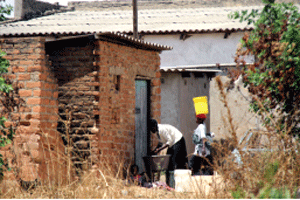
ON-GOING illegal selling of land in Domboshava communal lands is threatening agriculture and tourism activities that had become synonymous with the area.
BY HAZVINEI MWANAKA
During a recent visit by The Standard, it was observed that the once scenic features associated with the communal area that used to attract tourists are fast disapearing.
Huge, modern walled and electrified houses like those in Harare have dwarfed the few remaining huts that used to be a common feature around Domboshava.
Villagers are unlawfully parcelling out huge tracts of farming land to desperate home-seekers from Harare and other areas, leaving the area without enough space for agricultural activities.
The most affected areas include land that stretches from Mungate, Chiroodza down to Showground, Mutake and Chirombo. Villages like Sasa, Makumbe and Shumba are still not densely populated.
An environmental hazard is also looming as the villagers have resorted to digging out sand and moulding bricks for sale to the new land owners who are building houses.
It is feared that the illegal transformation of the area into an urban settlement would affect the country’s food security as the land would no longer be as agriculturally productive as it was before.
- Travelling & touring: Ever heard of a four-roomed cave?
- Illegal smuggling of US-made weapons from Afghanistan to Pakistan and its trade: a thriving business in Pakistan
- Building narratives: Pastor Mafukidze launches marriage handbook
- Travelling & touring: Ever heard of a four-roomed cave?
Keep Reading
Domboshava is in Mashonaland Central, one of Zimbabwe’s leading agricultural provinces and contributes significantly to the country’s food security.
Investigations by The Standard established that owing to overcrowding, villagers are also fast running out of graveyards.
Villagers said the massive illegal land parcelling had been encouraged by rumours that Domboshava would soon be accorded an urban centre status, which prompted people to grab the land while it was still affordable.
One of the villagers from Mutake area, who requested anonymity, said she sold her piece of land for US$4 000, but now feels she was cheated.
“There is strong speculation that the area will be developed into a satellite town so you never know what might happen to our land,” she said. “After I sold my land, the buyer later subdivided it and sold it for US$6 000 and I felt ripped off.”
Headman Murape of Domboshava — who oversees over 44 registered villages including Nyamande, Chiroodza, Parirewa, Zimbiru and Mungate — admitted that he was battling with the problem of the illegal selling of land in the area under his jurisdiction.
He said selling of communal land was illegal.
“The selling of land by villagers is against the law, ivhu haritengeswe [State land cannot be sold],” said Murape. “We are not supposed to sell land. actually it is a problem that has become rampant in my area.”
Murape said the number of people settled in the area had more than doubled since his installation as headman two years ago.
“The number of newcomers to the area is larger than of those that have always stayed here,” he said.
The headman had now taken it upon himself to investigate the underhand dealings for purposes of halting all illegal projects.
Some of the villagers, said Murape, were selling land on unsuitable places like wetlands and gardens once used for farming to the extent that they would be left without enough space for agricultural purposes. Domboshava is a major source of fresh produce for the Mbare market in Harare.
The villagers are also running out of grazing land for their livestock.
“We are now taking our animals to the hills for grazing and sooner or later we will be forced to reduce our heads,” said one villager, Edmore Chimukono. “Our children also no longer have the fun we used to enjoy. Their playing grounds have been sold to other people. Something needs to be done.”
Goromonzi West MP Beatrice Nyamupinga reiterated that the crowding of the area was threatening food security as well as exposing villagers to health disasters.
“The community is now facing a lot of challenges. Food security is threatened, and there is no longer enough land to produce food,” said Nyamupinga. “Diseases such as cholera might manifest because homes are now closer to each other.”
She promised to work closely with the community to deal with the problem.
Deputy Minister of Local Government, Public Works and National Housing, Joel Biggie Matiza dismissed speculation that Domboshava would soon be turned into an urban centre.
“Actually I am not aware of the speculation by these villagers, but I think it is just a way of justifying the illegal activities that they are doing in the area,” he said. “Those stands belong to the State and it is illegal to sell State land. People are busy selling stands and pocketing the money.”
Some of those that bought land from Domboshava said they preferred the place because it was close to Harare. Some people commute from Domboshava daily to work in Harare.
This revelation comes at a time massive land scams have been unearthed in Harare and Chitungwiza where land deals have seen some houses being built on wetlands and other undesignated places.
One of the houses that were built illegally in Chitungwiza’s Zengeza 5 suburb was demolished last week.
Last year government appointed a task team to investigate cases of unlawful parcelling out of land by Manyame Rural District Council and Chitungwiza Municipality to examine how thousands of people illegally acquired land for unsanctioned construction.











